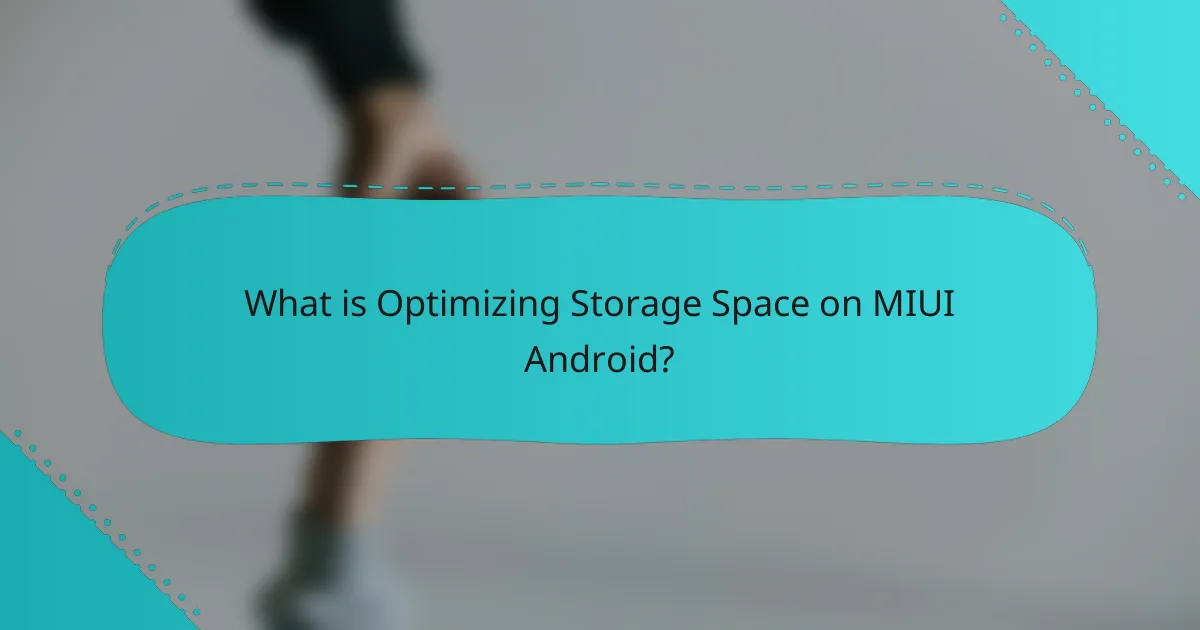
What is Optimizing Storage Space on MIUI Android?
Optimizing storage space on MIUI Android refers to the process of managing and freeing up storage on MIUI devices. This involves identifying and removing unnecessary files, apps, and data to improve device performance. MIUI provides built-in tools for storage management, such as the Cleaner app. Users can access these tools to analyze storage usage and delete cache files, duplicate files, and unused applications. Regular optimization can enhance device speed and responsiveness. Efficient storage management is essential, as it ensures that users can store new applications and media without encountering space limitations.
How does storage optimization work on MIUI Android?
Storage optimization on MIUI Android works by managing and freeing up space on the device. It identifies unnecessary files, caches, and duplicates that can be removed. MIUI employs a built-in cleaner tool that scans the device for these items. Users can manually review and delete files or allow the system to automatically optimize storage. Additionally, MIUI offers recommendations for uninstalling unused apps. The optimization process can also compress large files and manage storage settings effectively. This ensures that users maintain optimal performance and available space on their devices.
What key features contribute to storage optimization in MIUI?
Key features that contribute to storage optimization in MIUI include the Storage Cleaner, App Management, and File Management tools. The Storage Cleaner helps users identify and delete unnecessary files, such as cache and residual files. App Management allows users to uninstall or disable unused applications, freeing up space. File Management provides tools for organizing files and transferring them to external storage. These features collectively enhance storage efficiency and ensure optimal performance of the device. MIUI’s intelligent recommendations further assist users in making informed decisions about storage management.
How does MIUI handle storage management automatically?
MIUI handles storage management automatically by utilizing a built-in feature called Smart Storage. This feature identifies and removes unnecessary files, such as cached data and duplicate images. It also optimizes app storage by suggesting which apps can be uninstalled based on usage patterns. MIUI regularly scans for large files and unused apps, notifying users about potential cleanup opportunities. Additionally, it offers scheduled cleanup options to maintain optimal storage levels. These automatic processes help users manage their device storage efficiently without manual intervention.
Why is optimizing storage space important for MIUI users?
Optimizing storage space is crucial for MIUI users to ensure device performance and functionality. Limited storage can slow down system operations and affect app performance. MIUI devices often come with various pre-installed apps that consume space. Regular optimization helps in removing unnecessary files and apps. This process can enhance the overall user experience. Additionally, freeing up storage allows for more space to install new applications and store media. Efficient storage management can also prolong the device’s lifespan by reducing strain on the system.
What benefits does freeing up storage space provide?
Freeing up storage space enhances device performance and user experience. It allows applications to run more smoothly and reduces lag. Available storage improves device responsiveness. Users can download new apps or updates without issues. It also prevents system crashes caused by low storage. Additionally, it helps in maintaining battery life. Devices with ample storage tend to consume less power. Regularly clearing storage can prolong the lifespan of the device.
How can storage optimization enhance device performance?
Storage optimization can enhance device performance by freeing up space and improving access speeds. When storage is cluttered, devices slow down due to increased time needed to retrieve files. By removing unnecessary files and apps, devices can operate more efficiently. This leads to quicker load times for applications and smoother multitasking. Additionally, optimized storage reduces fragmentation, allowing for faster read and write speeds. According to a study by the University of California, devices with optimized storage can experience up to a 30% increase in performance metrics. Thus, effective storage management directly correlates with enhanced device performance.

What are the common techniques for cleaning up storage on MIUI Android?
Common techniques for cleaning up storage on MIUI Android include using the built-in storage cleaner, uninstalling unused apps, and clearing app caches. The storage cleaner can identify and remove unnecessary files. Users can access it through Settings > Storage. Uninstalling unused apps frees up space directly. Clearing app caches can reclaim storage occupied by temporary files. Additionally, transferring files to cloud storage helps in managing local storage. Regularly reviewing downloads and media files aids in maintaining optimal storage levels.
How can users manually remove unnecessary files?
Users can manually remove unnecessary files by accessing the file manager on their MIUI Android device. They should navigate to the storage section to view all files. Users can identify large or unused files in folders such as Downloads, Images, and Videos. Selecting files allows users to delete them individually or in bulk. After deletion, users should also check the Trash or Recycle Bin to permanently remove files. This process helps free up storage space effectively. Regularly performing this task can maintain optimal device performance.
What types of files can be safely deleted to free up space?
Temporary files can be safely deleted to free up space. These files are created by apps and the system for short-term use. Cache files are another type that can be removed without impacting functionality. Unused apps also occupy space and can be deleted if not needed. Duplicate files, often created during downloads, can be eliminated. Large media files, such as videos and photos, can be backed up and then deleted. Finally, old downloads from the downloads folder can be cleared out. These actions can significantly increase available storage space on MIUI Android devices.
How does clearing app cache contribute to storage optimization?
Clearing app cache contributes to storage optimization by freeing up space used by temporary files. These cached files accumulate over time as apps store data to speed up performance. When users clear the cache, they remove unnecessary files that can take up significant storage. For instance, clearing cache can recover megabytes to gigabytes of storage, depending on app usage. This process enhances device performance by allowing more efficient storage management. Regularly clearing app cache is a recommended practice for maintaining optimal storage levels on devices.
What built-in tools does MIUI offer for storage cleanup?
MIUI offers several built-in tools for storage cleanup. The primary tool is the “Cleaner” app, which scans for junk files, temporary files, and cache data. It allows users to delete unnecessary files easily. Another tool is “File Manager,” which helps in organizing and removing unwanted files. MIUI also includes a “Storage” section in settings that provides insights into storage usage. Users can identify large files and apps consuming space. Additionally, MIUI features a “Duplicate File Remover” to help eliminate duplicate files efficiently. These tools collectively enhance storage management on MIUI devices.
How can the MIUI Cleaner app assist in optimizing storage?
The MIUI Cleaner app optimizes storage by identifying and removing unnecessary files. It scans for cache files, temporary files, and residual files left by uninstalled apps. This process frees up valuable storage space on the device. Additionally, the app offers suggestions for deleting large files and duplicates. Users can also manage app data efficiently through the app’s interface. Regular use of the MIUI Cleaner app can significantly enhance device performance. According to Xiaomi, users can reclaim up to 1 GB of storage by using the app effectively.
What are the steps to use the Storage Manager feature?
To use the Storage Manager feature on MIUI Android, open the Settings app. Scroll down and tap on Storage. Select Storage Manager from the options available. The feature will analyze your storage space and provide recommendations. Review the suggested files for deletion or optimization. Confirm your selections by tapping on the clean-up options. Follow any additional prompts to complete the process. The Storage Manager will then optimize your storage space effectively.

What advanced strategies can enhance storage optimization on MIUI Android?
Utilizing advanced strategies can significantly enhance storage optimization on MIUI Android. One effective method is to enable the “Storage Cleaner” feature. This tool automatically identifies and removes unnecessary files, such as cache and residual files. Another strategy is to use “App Vault” to manage and prioritize app usage, which helps in identifying apps that consume excessive storage.
Additionally, utilizing “File Manager” allows users to categorize and delete large files efficiently. Users can also adjust the settings for automatic backups to cloud services, minimizing local storage usage. Disabling unused app notifications can prevent unnecessary data accumulation from apps. Finally, leveraging “MIUI’s Developer Options” to limit background processes can further optimize storage by reducing app data usage.
These strategies collectively contribute to a more efficient use of storage on MIUI devices, ensuring optimal performance and space management.
How can users utilize third-party apps for better storage management?
Users can utilize third-party apps for better storage management by installing applications designed to optimize and clean device storage. These apps can identify large files and duplicates, helping users free up space efficiently. Many third-party storage management apps offer features like cache cleaning and unused app removal. Users can schedule regular cleanups to maintain optimal storage levels. Some apps provide detailed reports on storage usage, allowing users to make informed decisions. Popular options include CCleaner and DiskUsage, which have proven effective for many users. Statistics show that users can reclaim significant storage space, often exceeding 20% of total capacity.
What are some recommended third-party apps for storage cleanup?
Some recommended third-party apps for storage cleanup include CCleaner, Clean Master, and Files by Google. CCleaner efficiently removes junk files and optimizes device performance. Clean Master offers features like cache cleaning and memory boosting. Files by Google helps manage storage by identifying large files and unused apps. These apps are widely recognized for their effectiveness in freeing up space on Android devices.
How do these apps compare to MIUI’s built-in tools?
Third-party apps often provide more advanced features compared to MIUI’s built-in tools. These apps may offer customizable cleaning options, allowing users to target specific file types. In contrast, MIUI’s tools typically focus on general cleaning without detailed customization. Additionally, third-party apps often include real-time monitoring and scheduling capabilities. MIUI’s built-in tools may lack these functionalities, making them less flexible. User reviews frequently highlight the effectiveness of third-party apps in optimizing storage space. This indicates a preference for their comprehensive features over MIUI’s basic offerings.
What best practices should users follow for ongoing storage optimization?
Users should regularly delete unnecessary files and apps to optimize storage. This includes removing duplicate files and uninstalling apps not in use. Regularly clearing cache from apps also helps free up space. Utilizing cloud storage for photos and videos can significantly reduce local storage usage. Users should also consider using storage management tools available on MIUI Android. These tools can identify large files and suggest deletions. Regularly backing up data ensures important files are not lost during cleanup. Updating the operating system can also optimize storage management features. Following these practices can maintain optimal storage performance over time.
How often should users perform storage cleanup on their devices?
Users should perform storage cleanup on their devices at least once a month. Regular cleanup prevents storage issues and enhances device performance. Monthly maintenance helps identify and remove unnecessary files. This practice can free up to 20% of storage space. Many users find that frequent cleanups lead to smoother operation. Additionally, setting reminders can ensure consistency. Regular cleanup reduces the risk of running out of space unexpectedly. Overall, monthly storage management is a practical approach for maintaining device efficiency.
What habits can help prevent storage issues in the future?
Regularly deleting unused apps can prevent storage issues. Unused apps consume space and may slow down devices. Check your app usage monthly. Remove apps that you haven’t opened in weeks.
Organizing files into folders helps maintain order. This practice makes it easier to locate important documents. Regularly review and delete unnecessary files. This reduces clutter and frees up space.
Using cloud storage for photos and videos is beneficial. It offloads large files from your device. Many services offer free storage options. This can significantly reduce local storage use.
Setting up automatic backups can help manage data. This ensures that important files are saved without manual intervention. Regular backups prevent data loss and optimize storage.
Periodic device cleanups are essential. Use built-in tools or third-party apps to identify space hogs. Schedule cleanups every few months to maintain optimal performance.
Monitoring storage usage regularly is crucial. Check your device’s storage settings to stay informed. This allows you to address issues before they become significant problems.
What troubleshooting steps can be taken if storage optimization fails?
Restart the device to refresh system processes. Check for software updates, as updates may fix bugs. Clear the cache of storage optimization apps to remove temporary files. Review storage settings to ensure optimization features are enabled. Uninstall or disable unused applications that may interfere. Free up space by deleting unnecessary files and media. Perform a factory reset as a last resort if issues persist. These steps can help resolve common storage optimization failures on MIUI Android devices.
How can users identify persistent storage issues on MIUI?
Users can identify persistent storage issues on MIUI by checking the storage settings. Navigate to “Settings” and select “Storage.” This section displays the total storage used and available space. Users should look for unusually high usage in categories like apps, images, or cached data. If any category shows excessive usage without clear reason, it may indicate a storage issue. Users can also utilize the built-in “Cleaner” tool for insights. This tool analyzes storage and suggests files for deletion. Regularly monitoring these metrics can help users maintain optimal storage performance.
What are the common solutions for resolving storage-related problems?
Common solutions for resolving storage-related problems include deleting unnecessary files, uninstalling unused apps, and utilizing cloud storage. Users can free up space by regularly clearing cache and temporary files. MIUI Android offers built-in tools for storage management, such as the Cleaner app. This app identifies large files and duplicates that can be removed. Users can also move files to external storage devices like SD cards. Regular backups to cloud services help prevent data loss while optimizing local storage. Implementing these techniques can significantly enhance device performance and storage capacity.
Optimizing storage space on MIUI Android involves managing and freeing up storage to enhance device performance. The article covers various techniques and tools, including the built-in Cleaner app, storage management features, and advanced strategies for effective cleanup. Key practices such as clearing cache, uninstalling unused apps, and utilizing cloud storage are emphasized to maintain optimal storage levels. Additionally, the article discusses the importance of regular storage optimization and troubleshooting steps for persistent issues.
